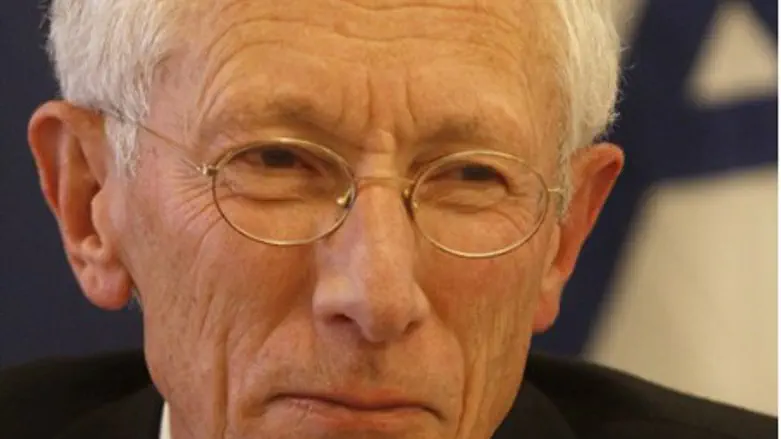
Bank of Israel governor Stanley Fischer has submitted his resignation and will leave his post in June, two years before the end of his second five-year term, the central bank said on Tuesday.
“The Governor of the Bank of Israel, Stanley Fischer, today informed the Prime Minister Benjamin Netanyahu of his intention to step down on June 30, 2013, after more than eight years as Governor," a bank statement said, without elaborating.
Fischer is much admired among central bankers, and has won numerous awards from numerous organizations. In 2010, Fischer was named Central Bank Governor of the Year by Euromoney magazine. Euromoney praised Fischer for his "bold move" to raise interest rates in September 2009, making Israel the first country to do so, saying his decision "proved well-guided and prescient".
The Tel Aviv stock exchange's index of the top 25 quoted firms fell 0.91 percent following the surprise announcement. Speaking to Arutz Sheva, Ron Eichel, an economist with the Meitav Group, said that he expected that Fischer's resignation would cause a period of instability. “The lack of clarity regarding Fischer's replacement, and uncertainty as to whether his policies would remain intact, will cause instability in the markets in the coming weeks. There is a potential for a devaluation of the shekel, and insurance costs for Israeli loans and bonds may rise,” Eichel said.
Fischer, 69, is credited with having steered an economic "miracle" in Israel despite the global downturn. Israel had one of the few robust economies among industrialized countries in recent years.
Shortly after Tuesday's announcement, Netanyahu thanked Fischer for his achievements. "Professor Stanley Fischer was a central partner in Israel's economic growth and the achievements of its economy," he said in a statement. “His experience, his wisdom and his international contacts opened the door to the economies of the world and helped the Israeli economy in its many achievements, during a period of global economic crisis," Netanyahu added. "I am certain that he will continue to contribute to the State of Israel."
Finance Minister Yuval Steinitz said Fischer had become "an asset not only for Israel's economy but also for its international image due to his worldwide status and connections".
Two weeks ago the government said the 2012 deficit had in fact hit 4.2 percent of GDP, nearly double that year's two percent target. Netanyahu said the figure was not far off the forecast of 3.9 percent and pointed to the year's 3.2 percent growth, unemployment below 7.0 percent and annual inflation of 1.6 percent.
A new government, yet to be formed after last week's general election, is expected to push for stringent economies when it presents the overdue 2013 budget, although Netanyahu says he does not plan tax hikes. Steinitz is calling for cuts worth 14 billion shekels ($3.75 billion/2.8 billion euros).
Born on October 15, 1943 in Northern Rhodesia, now Zambia, Fischer studied in both Britain and the United States, where he graduated from the Massachusetts Institute of Technology, before taking US citizenship. Between 1988 and 1990, he was a vice president and chief economist at the World Bank, and between 1994 and 2001, he served as a deputy managing director at the IMF, the number two position.
Steinitz has also spent time in the private sector, serving as vice chairman of Citigroup and president of Citigroup International between 2002 and 2005. During his time at the IMF he worked with US Treasury Secretary Timothy Geithner on resolving the Asia crisis and was previously a candidate to replace Geithner at the New York Federal Reserve.